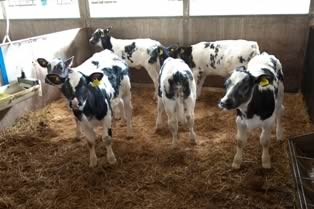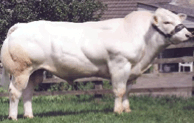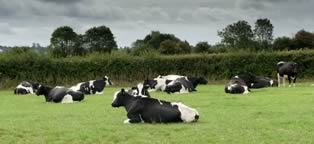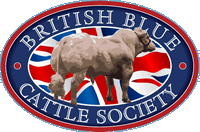Blues – The Choice for a 2,400 Dairy Cow Unit!
Sometimes the simplest methods are those which work best. That’s the thinking behind the vast Barber Family dairy and cheese enterprise, which surrounds Maryland Farm, Ditcheat in the beautiful countryside of Somerset. Reports Fiona Sloan.
The Barber family have been farming and making cheese at Ditcheat since 1833. In the early days, milk from the farm was sold locally and the cheese made was used to feed the family and farm workers. As time went on, the milk needed to make cheese increased and soon the family were buying milk from neighbouring farms as well. With the continued success of what is now the oldest family run cheese making business in the UK, more land was acquired over the years and the holding runs to around 2,500acres of prime Somerset dairy land, all of which is down to grass. Today the cheese business processes 120 million litres of milk from their own and neighbouring farms.

“Our main aim is to produce milk.” Says Chris Barber who describes himself as “the farmer” of the enterprise. “We have 11 holdings averaging around 200 cows with one larger unit of 450. Each has a contract herdsperson who works on contracted pence per litre basis so it’s in everyone’s interest to ensure that the cattle are well cared for and efficient.”
It is obvious as we drive around the units that the people who work for the family are dedicated to their job with the cows showing good bloom. It was the future development of the herd production, which encouraged the family to look at using the British Blue as the main sire in this flying herd of 2,400 Holstein x Friesian dairy cows. “We originally used the Charolais.” Says Chris “but from a milk production point of view we needed to look at something with a shorter gestation length. This made us look at the British Blue and we did our first trial to see how it would work.”
One hundred straws of semen from eight different untried bulls were used in cows on eight different units. Chris then checked the results looking in particular at gestation length, ease of calving and continuity of colour. “With all of our calves going away in batches to either suckler herds or for finishing, it was important to us that the calves look like a uniform bunch.” Adds Chris “We have good regular buyers for our 3 week old calves and we want to ensure that they were happy with the stock they were getting to continue that relationship.”

Twyning Ash Ukulele
After the first calves were on the ground, the results from all of the bulls were taken into account and Twyning Ash Ukulele was chosen as the stock bull for all of the 2,400 cows. “We calve everything outside from July to October,” Says Chris,” so we needed a bull which would calve easily, calves which were quick to suckle and that all had a good British Blue colour to them.” Ukulele gave us this and we have used him ever since. The decision on which bulls to trial originally, was also taken on advice from buyers, with whom he speaks regularly with the proof of the pudding in the eating and not in the figures. Following the success of this system of trialling bulls, the same method will be used again in the next couple of seasons when Chris starts to look for the next bull.
“Using the British Blue has eliminated 30% of the calving problems throughout the units” estimates Chris. “We calve heifers at two and a half and my buyers are looking to buy replacement heifers, generally in the North of England and Scotland with some Friesian blood in them to ensure good quality dairy animals which will work well in the units.” With an overall fertility in the herd of 55% settling to first service and some units as high as 65%, the contract herdsmen seem to be doing a good job. “We have good markets for our Blue X heifer calves as suckler replacements as well as for finishing cattle so we need calves which will do well for them. Following Foot and Mouth we lost our markets to Europe so it is important that we maintain our markets here.”
The calves are left outside with their mothers for three days after calving to ensure that they receive enough colostrum, before being brought inside and batched in lots of 7 calves and put in the calve unit, a collection of converted pig sheds, which are perfect for rearing batches of young calves. Walking through the unit, the first thing that you notice is how quiet it is. The calves are all fed, happy and doing well in their well aired pens. The second thing you realise in units of 250 calves each is that there is no smell! No additional colostrum is used and these British Blue calves, which look like peas in a pod, are obviously thriving in their first few weeks and are all fed on Volac Blossom milk powder
The aim of the milk production is ultimately to produce the cheese for which the Barber Family has become best known. The system in place, allows Chris as head of the farming enterprise, to oversee everything efficiently and ensure the production of the wonderful 1833 Vintage Cheddar, which sells nationally through delicatessens and Sainsbury’s’ West Country Farmhouse Cheddar produced by the cheese factory on site. The family employs around 200 people locally and rents ground to National Hunt trainer Paul Nichols, where he has gallops and housing for what Chris describes as his “superstar” neighbours, Denman and Kauto Star.
Everything about the enterprise is geared towards ‘simple and successful.’ 3,500 acres of pit silage is made in house with the 5 tractor drivers who cover the units and with good maintenance and herdsmanship by the contract herdsmen, there is no current need to develop a system which is working well.

Over 180 years of investment, not only in land but in the people that work it and their knowledge, has made this dairy and cheese making family an expanding business, which will continue onto the next generation and beyond. The success of the Twyning Ash Bull has also ensured the future of the British Blue at Maryland as the sire of choice for the foreseeable future.
Sitting having a coffee after our “tour” at the table in the recently converted kitchen, we are surrounded by signs of how important family life is. Chris is rightly proud of being able to buy back this magnificent old farmhouse three years ago, which his grandfather originally bought some 40 years previously with some land attached and had to sell the house on to finance the purchase. He has already rushed off for an hour that morning to watch his daughter compete in a local event and is back in his pick up. All of his family are schooled locally and together with brother Giles and Cousins Anthony and Charlie, AJ & RG Barber is an integral part of country life in Somerset.

